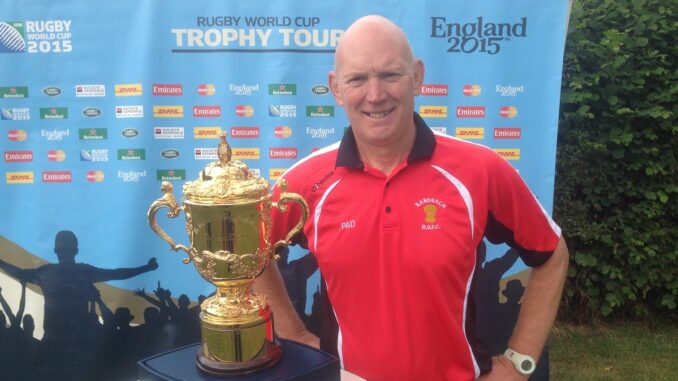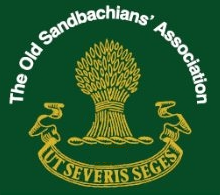
A unique, local relationship will take on added significance this year, with the Old Sandbachians Association (OSA) and Sandbach School taking out season-long sponsorship at Sandbach RUFC.
Both the school and Rugby Club have proud respective histories which remain intrinsically linked, with the club in its current guise reformed by the OSA as Old Sandbachians RUFC in 1956, making this the 66th year of the connection between the two.
It’s a fact personified by acting ‘Bach’ President, Pad Davenport, who has been a key figure in the growth of the Rugby Club since first setting out as a player at the age of 16, having joined the school four years earlier.
Ryan Grant caught up with the former schoolboy, captain and coach, to discover why theirs is a long-standing bond which is stronger than ever…
Firstly, Pad, what can you tell us about your journey to this point?
“Most people know me as ‘Pad’ or ‘Paddy’ Davenport, which is actually a nickname I’ve had since school. My actual name is Peter Andrew Davenport, which is where the ‘P-A-D’ comes from, and I’ve been involved with the Rugby Club since my school days.
I played when I was 16 years old, my two elder brothers also played and were very good players. I was Colts captain; we had a very good team at school at the time, and we won the Manchester Schools Cup in the year that I left. I went to university and played at a few other clubs before returning in my mid-20s and becoming captain for three years. Later, that was in the advent of leagues and the like, so we progressed quite well because that was, more or less, the core of the team that had been very successful at school.
In particular, a coach at the school, called John Harrop, was fairly instrumental in that. I then retired from the first team at 36 and coached a Colts side for three years, before coaching the first team. I then took a break away from the club for 10 or 15 years before coming back as Director of Rugby, and I’ve been President for the last five years.
I also tend to do first-team admin, press reports and other bits… the President bit isn’t actually that difficult! It’s very much my home club, and I’m just trying to put something back in after all it’s given me. It helped me tremendously with my career, and it all started off with the school.”
You must have seen all manner of change in that time!
“Absolutely. The club reformed in 1956, the year I was born. Back in those days, players used to change in a shed behind the local pub on Middlewich Road, before we had a chance to build a clubhouse. They used to always play on pitches at the school, but I think the school found eventually it was difficult to accommodate, so they were looking for quite some time to build a clubhouse and that chance came in the ‘70s, when we bought this ground here.
The clubhouse was mainly built by members at the time, using all of their various skills, and that’s been added to various times over the years with extensions. It’s a great success story as a community club, but has its roots in the school. There’s a symbiotic relationship with the school and many of our players have traditionally come from the school. When the school went away from having specialist rugby coaches, the Rugby Club struggled, but I’m pleased to say that’s not the case now, and long may it continue.”
If you can cast your mind back, what do you remember of your time at the school?
“I didn’t actually get to the school until I was 12, so it was quite different after doing a year at the local secondary school at the time. It was chalk and cheese between the two, really. Secondary school was a case of ‘stick’, where everyone was controlled by that threat, but it was very much ‘carrot’ at the grammar school, and anyone who excelled in anything was lauded. That really appealed to me, and I really enjoyed my time there.
I played in all the rugby, football and cricket teams, and that helps develop you in terms of those team ethics, so I look back on that time with a great deal of fondness. Without doubt, the school has made and influenced me, both academically and as a character.”
Do you think it’s been the case that when the school does well, the Rugby Club does well?
“Generally, successful sides will tend to stick together. I still regularly see three or four guys out of the side I mentioned; we still go for bike rides and mess about even now. If you look at the core of the current first team, that bond is massive and probably why you see a number of players returning, having had careers at the top level. They want to play with their mates again, and many came from the school like I did.
It’s great when the Old Sandbachians and past players return to the club, because some travel quite a distance and there’s an instant bond. I look forward to that day, and hopefully we get some good numbers [watching], because that’s important as well. It creates that dynamic and keeps people coming back. The signs around the place stand for ‘Bach for life’, with Bach being the nickname of the club now.”
What can you tell us about the team’s current fortunes?
“One of the big things about the club is that, in the early days when leagues came in, we made a conscious decision to stay as an amateur club. At the moment, we’re probably one of the highest-placed amateur clubs in the whole of the country – there can’t be too many above us that are truly amateur clubs. It’s certainly possible that we could go to the league ahead, but it’s difficult to say how we might fare in that. I do think there will be a time when more and more clubs follow our model, because there isn’t the finance there, with many clubs above us relying on benefactors.
In terms of ambition, if we keep doing the right things, the results almost take care of themselves. We’ve shown we can hold our own in this league over a number of years. If you come to us, we’ll improve you, because we believe in top quality coaching here.”
Finally then, after so much positive growth, what’s next for the Rugby Club?
“We’ve just done another strategic review, which is probably the third in the last 20 years. We’ve achieved a lot in that time; there is a plan in place and I think it helps create that framework to move forward. The new one is ‘B4L 2020’, the idea being that at the age of 20, there are 20 people involved still that came through the Mini-Juniors section.
That’s what we want to see if you want a thriving club. We do quite well; there are some major clubs that have struggled or gone to the wall, but we’re fortunate to have the school and not a massive amount of competition in this part of the world compared to others.”
As part of the sponsorship, a dedicated matchday event was held at the Rugby Club in December 2022, a report can be found HERE.

